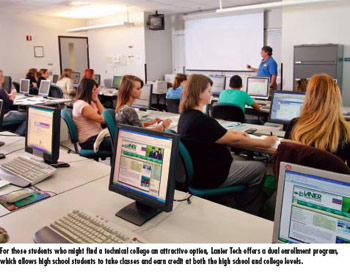EDUCATION INSIGHT: Early College Planning
Giving Your Child a Leg Up
by Melanie F. Gibbs
 Lots of schools bill themselves as offering a college preparatory curriculum, meaning they offer courses that institutions of higher learning require of students seeking admission. But is that really enough to give your child a leg up for college? They might be able to get in to college, but will it be the school of their choice, and will they be able to excel once they are there?
Lots of schools bill themselves as offering a college preparatory curriculum, meaning they offer courses that institutions of higher learning require of students seeking admission. But is that really enough to give your child a leg up for college? They might be able to get in to college, but will it be the school of their choice, and will they be able to excel once they are there?
Because competitive colleges consider whether students took advantage of the most rigorous course of study available to them, Advanced Placement (AP) and International Baccalaureate (IB) programs will help position students well. Furthermore, scoring well on exams for these programs can help students bypass certain college classes. Do well enough on those exams in high school, and new college freshman could start college with significant credits under their belt—which translates into tuition saved.
“Parents should encourage their students to take full opportunity of the academic offerings of their high schools and encourage them to step up and take more rigorous coursework when they are invited to do so,” says Missy Sanchez, Director of College Counseling at Woodward Academy. Showing rigor is defined by taking additional coursework beyond what their high school may require for graduation, studying two or three foreign languages with several years spent in each, doubling up on science, math, English and social studies courses in the same year, and taking honors or AP classes.
 Parents also can help their children get ahead, according to Thomas Algarin, Director of Communications & Information, Marietta City Schools, by encouraging students to become involved in extracurricular activities.
Parents also can help their children get ahead, according to Thomas Algarin, Director of Communications & Information, Marietta City Schools, by encouraging students to become involved in extracurricular activities.
“Additionally, colleges hope to see that prospective students have been involved in their high school community, their home community and/or their church or place of worship for a couple of reasons,” explains Sanchez. “Colleges are looking to see how prospective students will enrich their campus, and they want to know that students are able to balance academic work with extracurricular opportunities.”
Another way to give your child a leg up is to ensure you choose a high school that will give them plenty of college counseling.
Sandy Ferko, head of the counseling department at Atlanta International School, says that in her school, counselors begin meeting with freshmen. “We talk about the five things colleges will be looking for—grades, scores, resume, recommendations, and writing ability—we look at the blank transcript and talk about what students can do to make the transcript reflect favorably on them—we talk about the things teacherswill be looking at as they write recommendation letters.”
 Likewise, Algarin reports that at Marietta High School each year counselors host parent/student meetings to share information on graduation requirements, financial aid and college entrance requirements.
Likewise, Algarin reports that at Marietta High School each year counselors host parent/student meetings to share information on graduation requirements, financial aid and college entrance requirements.
At Woodward, a team of four college counselors provides programs for parents and students, including student panels and programs offering advice from college professionals, on-campus college fairs, a Mock Admissions workshop and a scholarship/financial aid workshop.
A good high school college prep program will be reflected, not only in college acceptance rates, but also in terms of the specific institutions to which the students are accepted and what scholarship funds they receive.
For those students who might find a technical college an attractive option, Lanier Technical College offers a dual enrollment program. “High School students can take classes and get credit both at the high school and college level,” says David Parrish, Director of Marketing and Public Relations. He points out that technical colleges have changed. “We provide a similar path as traditional higher education does, but we provide skills that allow individuals to move into the marketplace very quickly.” If the traditional high school environment didn’t work for a student because of their learning style, Parrish adds, “We can work with the student to bring them up to speed.”
Brenau Academy will give qualified high school students access to the full range of courses at Brenau Women’s College starting in the 2011-2012 academic year.
 In addition to its own Early College, the University System of Georgia offers residential programs for high school-aged students at two locations. Located on the campus of the University of West Georgia, the Advanced Academy of Georgia is a residential, early-entrance-to-college program for gifted and talented high school-aged students. Students take regularly scheduled university classes taught by university professors for which they receive high school and college credit.
In addition to its own Early College, the University System of Georgia offers residential programs for high school-aged students at two locations. Located on the campus of the University of West Georgia, the Advanced Academy of Georgia is a residential, early-entrance-to-college program for gifted and talented high school-aged students. Students take regularly scheduled university classes taught by university professors for which they receive high school and college credit.
Similarly, the Georgia Academy of Aviation, Mathematics, Engineering, and Science (GAMES)—a “living-learning opportunity” at Middle Georgia College—is designed to “provide an academically enriched residential environment for top-performing high school juniors and seniors seeking to enhance and accelerate their education by simultaneously earning their high school diploma and associate degree.”
The University System also offers a web site—GAcollege411.org—to help Georgia students plan, apply and pay for college. The site even includes a section to help Middle School students start their college plan.
 The bottom line is that it’s never too early to start planning. “Parents can help give their children a leg up for college by helping them to understand that they need to work to build a strong four-year academic record that will position them best for college placement,” says Sanchez. “Parents should encourage their children to aspire to solid preparation with some time spent daily on homework and applaud learning in a curriculum that stresses writing and the development of critical thinking. They should remind their children that colleges will be seeing all of their academic work from freshman year on. The ninth grade does count. Colleges do not judge prospective students on their final dash to the graduation line; rather, they are looking to see how students have performed in the overall high school career.”
The bottom line is that it’s never too early to start planning. “Parents can help give their children a leg up for college by helping them to understand that they need to work to build a strong four-year academic record that will position them best for college placement,” says Sanchez. “Parents should encourage their children to aspire to solid preparation with some time spent daily on homework and applaud learning in a curriculum that stresses writing and the development of critical thinking. They should remind their children that colleges will be seeing all of their academic work from freshman year on. The ninth grade does count. Colleges do not judge prospective students on their final dash to the graduation line; rather, they are looking to see how students have performed in the overall high school career.”
Even when their children are young, parents can help their children prepare for college. “The best thing parents can do for their children is help them enjoy reading,” says Ferko. “Read to them, listen to them read, ask questions to make them think.”
TIME-LINE FOR PREPARATION
9th Grade:
• Meet with high school guidance counselor.
• Plan academic courses.
• Begin researching schools.
10th Grade:
• Take the PSAT in October.
• Participate in extracurricular activities and keep your grades up!
• Continue meeting with guidance counselor and researching schools.
11th Grade:
• Maintain GPA and participate in extracurricular activities.
• Create and maintain a “resume” of experiences, awards and activities.
• Study for standardized tests as necessary.
• Take the SAT or ACT.
• Meet with college counselor and begin to narrow down school choices. Familiarize yourself with admission requirements.
• Visit colleges and universities. Schedule any interviews in advance.
• Practice writing application essays.
12th Grade:
• Fill out college and financial aid applications and mail out early enough to meet deadlines. Follow up to make sure the application is complete.
• Take necessary tests, including the SAT or ACT, in the Fall.
• Send mid-year reports if necessary to the schools of your choice.
• You will likely hear from all schools by April 15. Choose your school and send in the deposit.
• Celebrate and relax!







